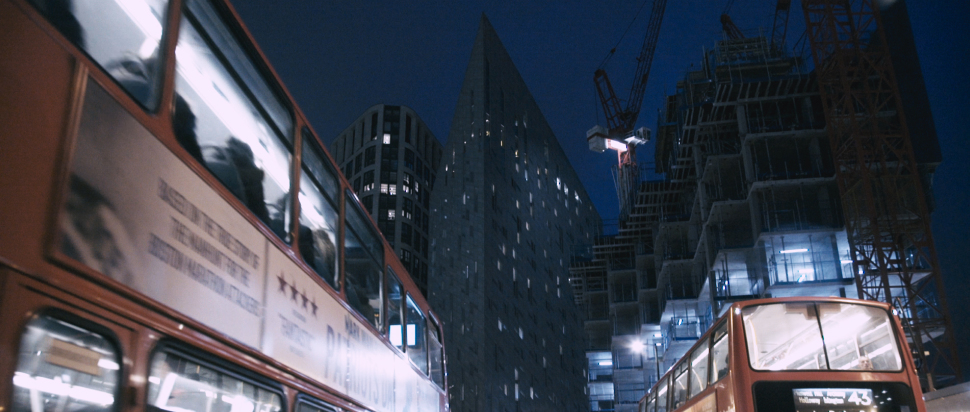Rent Out of Shape: Fredrik Gertten on housing doc Push
This year's Take One Action opens with timely doc Push, which takes a compelling deep dive into global housing issues. We speak to Push's director, Fredrik Gertten, who explains that the current crisis is much more complex than rampant gentrification
The housing market is fucked, and it’s nothing to do with millennials’ predilection for avocado toast. That's the resounding message of Fredrik Gertten’s fleet-footed documentary Push, which takes a global overview of the crisis in housing, with stops in Chile, Canada, Germany, Spain and Seoul as well as here in the UK.
Speaking to us down the phone from his home in Malmö, Sweden, Gertten tells us he’s long been interested in the urban environment. “As a print journalist, when I had a column in a daily here in Malmö, I was writing about the architecture of cities from a citizen's perspective. Then as a filmmaker, one of my previous films was called Bikes vs Cars, which was about city planning, or how the car lobby took over our cities and turned them into something less pleasant. So I see the housing crisis as another step in the same research.”
Push is a bit more personal. “It's been a story all my life,” he says of the housing market. “I still live in a city-owned rental, and I've been feeling like a loser a long time because all my friends, they've bought apartments and, on paper, are getting richer and richer all the time. There's been a generation who've had an advantage when it comes to housing, and that is over now for sure.”
He was very aware of the problem in Sweden, but for Push he wanted the bigger picture. “To really understand this crisis you need to look for the global pattern," he says, "because if you tried to talk about housing politics in the UK, for example, you'll end up with a lot of history of social housing and the history of this and the history of that; you get a lot of details and it gets complicated. But if you go for what is happening at the same time in many other places, we can zoom out from the local political games and perhaps find a new understanding.”
Gertten called on many housing experts to contribute to the film, although one Canadian lawyer, Leilani Farha, the UN Special Rapporteur on Adequate Housing, quickly became central. “I found Leilani on Twitter and I followed her and her work for maybe half a year.” After meeting Farha IRL while she visited London, Gertten realised he'd found his film's hero. “I thought she had an energy that could be good to have in the film, but once I met her I realised she was more than an expert, she's actually somebody you can spend time with.”
Farha’s journey to convince governments around the globe that housing is a human right became the backbone of the film. She also became Gertten’s sounding board and collaborator as he tried to pin down Push’s structure. “I'm not an academic, so I kinda need to understand things step-by-step and give myself new questions.” Over Twitter and WhatsApp, the pair would share news stories and articles. “It was always the simple questions: What is this? What is happening here? How should we understand this?”
What were some of those stories? “All the empty houses in London, for example, were an obvious story,” he says. Gertten is referring to the 22,481 long-term vacant properties in the UK capital, most of which are owned by Russian oligarchs and faceless investment corporations. In Push, we meet Occupy Belgravia, a group of squatters who are occupying a £25 million house. “I mean, it’s just a few blocks away from Buckingham Palace for God's sake. It's just a shitty house, nobody's been living there for 20 years, it's just this empty shell, but that's suddenly worth a lot of money. Of course, on the surface, from our normal citizens' perspective, it looks like it’s bad business for the investors, but it's obviously not. I wanted to know the cause of that.”
The film at times feels like a thriller. Blackstone, a shady private equity multinational based in New York but with tendrils in most major cities across North America and Europe, emerges as the film’s chief antagonist, while Farha is the plucky hero trying to uncover the corruption. “When you make a film, your biggest challenge is to make your audience stay within the film, to actually sit and watch it, so you need to use the narrative tools that already exist,” he says. “For me, Leilani was like a private detective figure maybe. And that's also her true dynamic. She's actually out there investigating and trying to understand companies like Blackstone.”
One thing Gertten hopes will emerge from Push is a more sophisticated way of thinking about and discussing the housing crisis. “We need to create a new language to talk about it,” he suggests. “We can't keep talking about gentrification; we can't just point fingers against the hipsters. It's not only silly, it's also creating a divided society, which is not real, it's a fake divide because I think also the traditional landlords are suffering because of these multinationals.” He also hopes there’s a glimmer of hope. “If you're a very pessimistic person, you’ll leave the film totally depressed. But if you still believe in change, and still believe that we can do things, then there's hope in the end.”
Push opens Take One Action 2019 – Filmhouse, Edinburgh, 18 Sep, 8.20pm; Centre For Contemporary Arts, Glasgow, 19 Sep, 7.30pm
Take One Action runs 18-29 Sep at various venues in Edinburgh and Glasgow
takeoneaction.org.uk/film/push/
